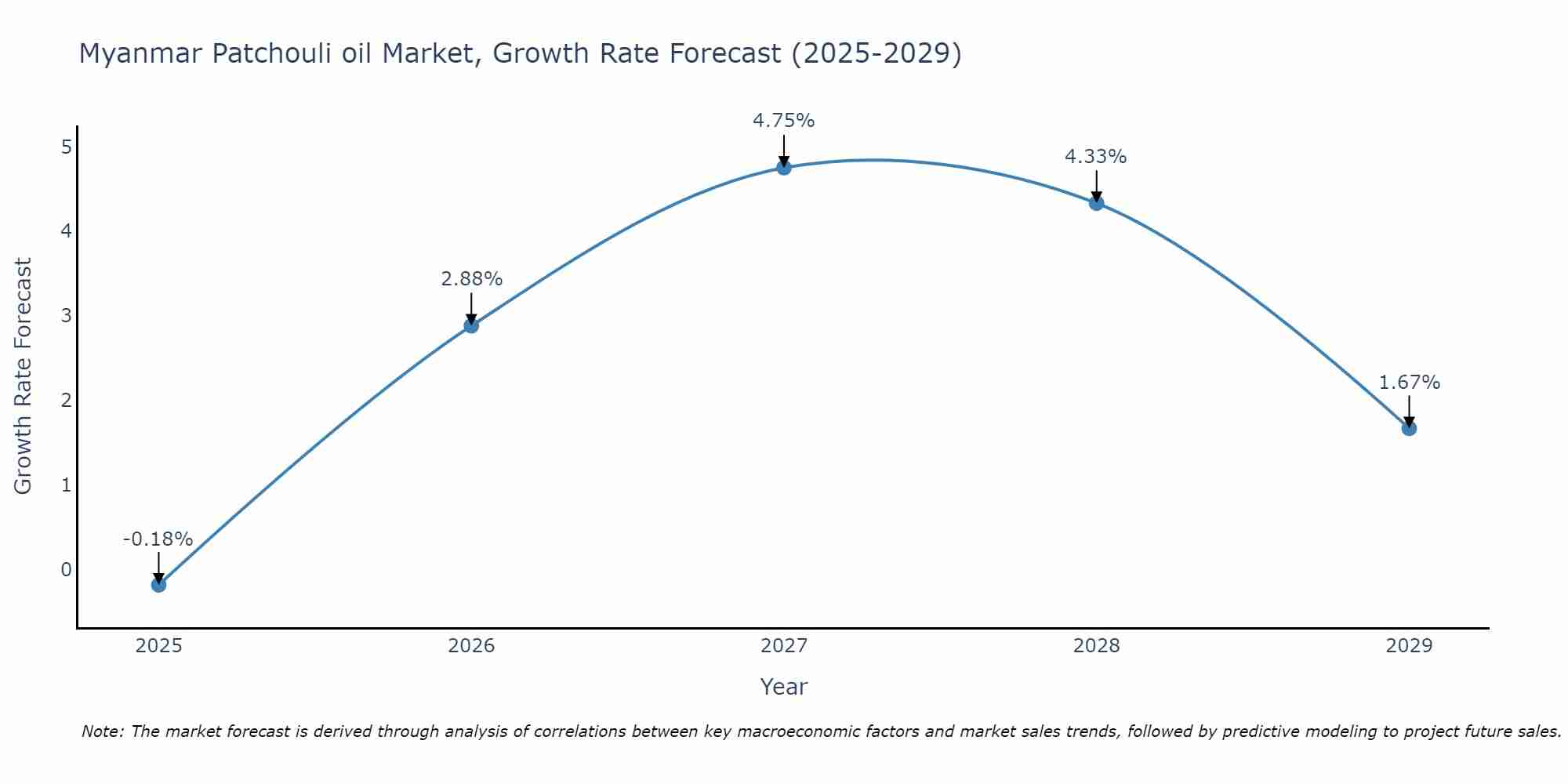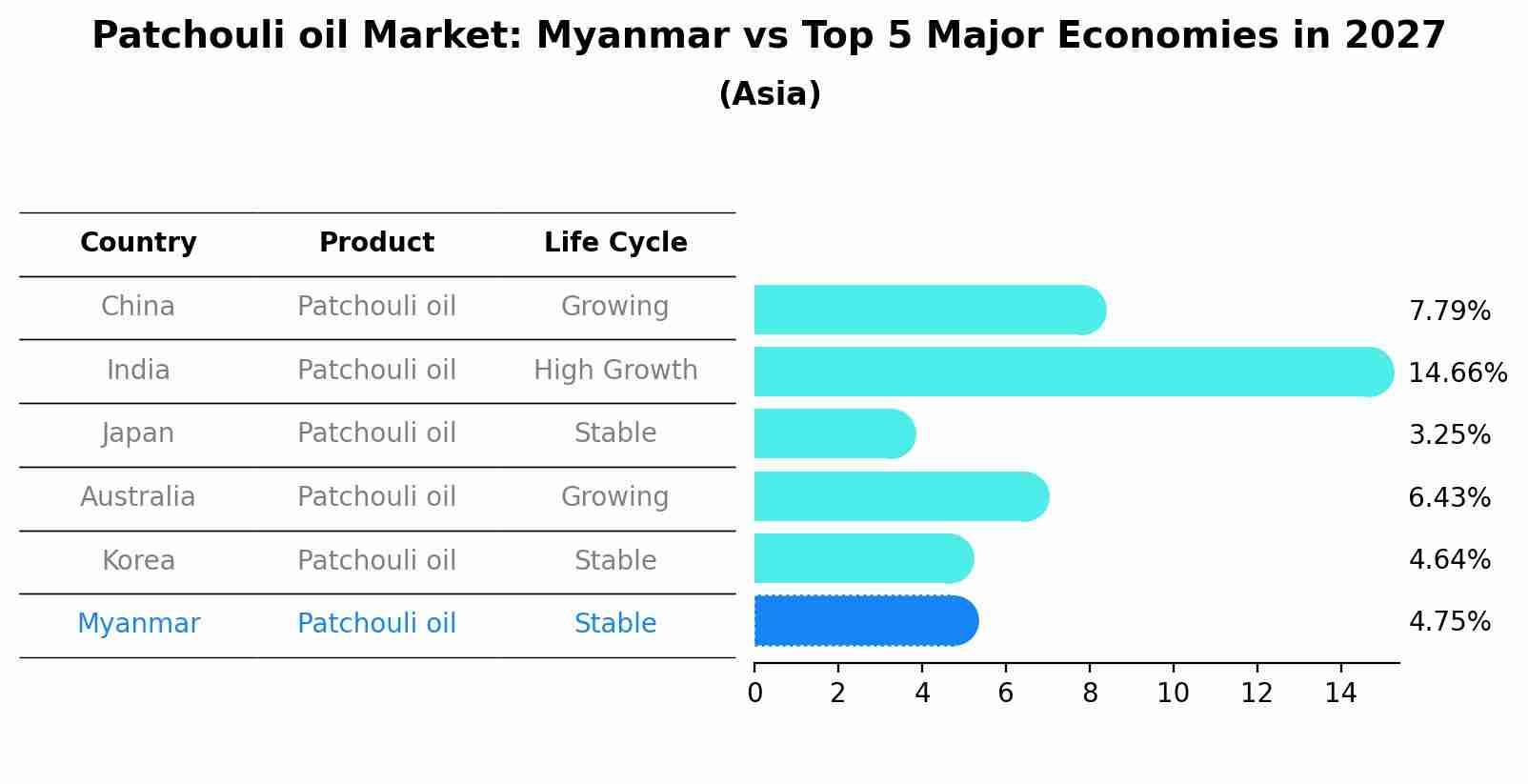Myanmar Patchouli oil Market (2025-2031) Outlook | Trends, Value, Industry, Share, Forecast, Companies, Growth, Analysis, Size & Revenue
| Product Code: ETC093893 | Publication Date: Jun 2021 | Updated Date: Jun 2025 | Product Type: Report | |
| Publisher: 6Wresearch | Author: Shubham Padhi | No. of Pages: 70 | No. of Figures: 35 | No. of Tables: 5 |
Myanmar Patchouli oil Market Size Growth Rate
The Myanmar Patchouli oil Market is projected to witness mixed growth rate patterns during 2025 to 2029. The growth rate begins at -0.18% in 2025, climbs to a high of 4.75% in 2027, and moderates to 1.67% by 2029.

Patchouli oil Market: Myanmar vs Top 5 Major Economies in 2027 (Asia)
By 2027, the Patchouli oil market in Myanmar is anticipated to reach a growth rate of 4.75%, as part of an increasingly competitive Asia region, where China remains at the forefront, supported by India, Japan, Australia and South Korea, driving innovations and market adoption across sectors.

Myanmar Patchouli oil Market Overview
The Myanmar Patchouli oil market is witnessing steady growth due to increasing demand from the cosmetics, fragrance, and aromatherapy industries. Known for its unique earthy and musky scent, Patchouli oil is widely used in perfumes, incense, and skincare products. Myanmar`s favorable climate and soil conditions make it an ideal location for cultivating Patchouli plants, leading to high-quality oil production. The market is driven by growing consumer preference for natural and organic products, as Patchouli oil is valued for its therapeutic properties and its ability to promote relaxation and reduce stress. Key players in the market focus on sustainable cultivation practices and organic certification to meet the rising demand for ethically sourced Patchouli oil. Overall, the Myanmar Patchouli oil market is poised for further expansion in the coming years.
Myanmar Patchouli oil Market Trends
The Myanmar Patchouli oil market is currently experiencing a surge in demand due to the growing popularity of natural and organic products in the beauty and personal care industry. Patchouli oil is being increasingly used in perfumes, cosmetics, and aromatherapy products for its earthy and exotic fragrance. Additionally, the rise of sustainable and ethical consumer practices has led to a preference for Patchouli oil sourced from Myanmar, known for its high quality and unique aroma profile. Key trends in the market include the adoption of eco-friendly extraction methods, the promotion of fair trade practices with local farmers, and the expansion of Patchouli oil usage in home fragrance products. Overall, the market is witnessing steady growth driven by consumer preferences for natural ingredients and sustainable sourcing practices.
Myanmar Patchouli oil Market Challenges
In the Myanmar Patchouli oil market, challenges include limited infrastructure for cultivation and production, leading to inconsistent quality and supply. Additionally, lack of standardized grading systems and certifications makes it difficult for buyers to assess the quality of the oil. Political instability and regulatory uncertainties in the region further compound these challenges, impacting market confidence and hindering international trade opportunities. Furthermore, competition from other major Patchouli oil producing countries, such as Indonesia and India, presents a significant hurdle for Myanmar to establish itself as a prominent player in the global market. Overall, addressing these challenges through investment in infrastructure, quality control measures, and regulatory reforms will be crucial for the sustainable growth of the Myanmar Patchouli oil market.
Myanmar Patchouli oil Market Investment Opportunities
In the Myanmar Patchouli oil market, there are several promising investment opportunities for potential investors. With the increasing demand for natural and organic products in the beauty, fragrance, and aromatherapy industries, Patchouli oil has gained popularity for its unique scent and therapeutic properties. Investing in Patchouli oil production and cultivation in Myanmar can be lucrative due to the country`s ideal climate and soil conditions for growing Patchouli plants. Additionally, there is a growing trend towards sustainable and ethical sourcing practices, making investments in organic and fair trade Patchouli oil production appealing to environmentally conscious consumers. Collaborating with local farmers and producers to establish a reliable and high-quality supply chain can also provide a competitive edge in the market.
Myanmar Patchouli oil Market Government Policy
The government policies related to the Myanmar Patchouli oil market include regulations on cultivation, extraction, and export of Patchouli oil. The Ministry of Agriculture and Irrigation oversees the licensing and monitoring of Patchouli cultivation to ensure sustainable practices and quality control. Additionally, there are export restrictions and quotas imposed by the government to manage the supply and demand of Patchouli oil in the international market. The government also provides support and incentives to farmers and producers in the form of subsidies, training programs, and research initiatives to promote the growth of the Patchouli oil industry in Myanmar. Overall, government policies aim to regulate and promote the sustainable development of the Patchouli oil market while ensuring compliance with international standards and market requirements.
Myanmar Patchouli oil Market Future Outlook
The Myanmar Patchouli oil market is poised for growth in the coming years due to increasing demand from industries such as cosmetics, perfumery, and aromatherapy. The market is expected to benefit from the rising popularity of natural and organic products, as Patchouli oil is known for its earthy and exotic fragrance. Additionally, the growing awareness about the therapeutic properties of Patchouli oil, such as its anti-inflammatory and anti-microbial properties, is likely to drive market growth. With Myanmar being one of the key producers of high-quality Patchouli oil globally, the country is well-positioned to capitalize on the growing demand. However, challenges such as sustainability practices and market competition may impact the market dynamics in the future.
Key Highlights of the Report:
- Myanmar Patchouli oil Market Outlook
- Market Size of Myanmar Patchouli oil Market, 2021
- Forecast of Myanmar Patchouli oil Market, 2031
- Historical Data and Forecast of Myanmar Patchouli oil Revenues & Volume for the Period 2021 - 2031
- Myanmar Patchouli oil Market Trend Evolution
- Myanmar Patchouli oil Market Drivers and Challenges
- Myanmar Patchouli oil Price Trends
- Myanmar Patchouli oil Porter's Five Forces
- Myanmar Patchouli oil Industry Life Cycle
- Historical Data and Forecast of Myanmar Patchouli oil Market Revenues & Volume By Type for the Period 2021 - 2031
- Historical Data and Forecast of Myanmar Patchouli oil Market Revenues & Volume By Dark Patchouli Oil for the Period 2021 - 2031
- Historical Data and Forecast of Myanmar Patchouli oil Market Revenues & Volume By Light Patchouli Oil for the Period 2021 - 2031
- Historical Data and Forecast of Myanmar Patchouli oil Market Revenues & Volume By Application for the Period 2021 - 2031
- Historical Data and Forecast of Myanmar Patchouli oil Market Revenues & Volume By Perfumery for the Period 2021 - 2031
- Historical Data and Forecast of Myanmar Patchouli oil Market Revenues & Volume By Medicine for the Period 2021 - 2031
- Historical Data and Forecast of Myanmar Patchouli oil Market Revenues & Volume By Flavorings for the Period 2021 - 2031
- Historical Data and Forecast of Myanmar Patchouli oil Market Revenues & Volume By Others for the Period 2021 - 2031
- Myanmar Patchouli oil Import Export Trade Statistics
- Market Opportunity Assessment By Type
- Market Opportunity Assessment By Application
- Myanmar Patchouli oil Top Companies Market Share
- Myanmar Patchouli oil Competitive Benchmarking By Technical and Operational Parameters
- Myanmar Patchouli oil Company Profiles
- Myanmar Patchouli oil Key Strategic Recommendations
Frequently Asked Questions About the Market Study (FAQs):
- Single User License$ 1,995
- Department License$ 2,400
- Site License$ 3,120
- Global License$ 3,795
Search
Thought Leadership and Analyst Meet
Our Clients
Related Reports
- Afghanistan Rocking Chairs And Adirondack Chairs Market (2026-2032) | Size & Revenue, Competitive Landscape, Share, Segmentation, Industry, Value, Outlook, Analysis, Trends, Growth, Forecast, Companies
- Afghanistan Apparel Market (2026-2032) | Growth, Outlook, Industry, Segmentation, Forecast, Size, Companies, Trends, Value, Share, Analysis & Revenue
- Canada Oil and Gas Market (2026-2032) | Share, Segmentation, Value, Industry, Trends, Forecast, Analysis, Size & Revenue, Growth, Competitive Landscape, Outlook, Companies
- Germany Breakfast Food Market (2026-2032) | Industry, Share, Growth, Size, Companies, Value, Analysis, Revenue, Trends, Forecast & Outlook
- Australia Briquette Market (2025-2031) | Growth, Size, Revenue, Forecast, Analysis, Trends, Value, Share, Industry & Companies
- Vietnam System Integrator Market (2025-2031) | Size, Companies, Analysis, Industry, Value, Forecast, Growth, Trends, Revenue & Share
- ASEAN and Thailand Brain Health Supplements Market (2025-2031) | Strategy, Consumer Insights, Analysis, Investment Trends, Opportunities, Growth, Size, Share, Industry, Revenue, Segments, Value, Segmentation, Supply, Forecast, Restraints, Outlook, Competition, Drivers, Trends, Demand, Pricing Analysis, Competitive, Strategic Insights, Companies, Challenges
- ASEAN Bearings Market (2025-2031) | Strategy, Consumer Insights, Analysis, Investment Trends, Opportunities, Growth, Size, Share, Industry, Revenue, Segments, Value, Segmentation, Supply, Forecast, Restraints, Outlook, Competition, Drivers, Trends, Demand, Pricing Analysis, Competitive, Strategic Insights, Companies, Challenges
- Europe Flooring Market (2025-2031) | Outlook, Share, Industry, Trends, Forecast, Companies, Revenue, Size, Analysis, Growth & Value
- Saudi Arabia Manlift Market (2025-2031) | Outlook, Size, Growth, Trends, Companies, Industry, Revenue, Value, Share, Forecast & Analysis
Industry Events and Analyst Meet
Whitepaper
- Middle East & Africa Commercial Security Market Click here to view more.
- Middle East & Africa Fire Safety Systems & Equipment Market Click here to view more.
- GCC Drone Market Click here to view more.
- Middle East Lighting Fixture Market Click here to view more.
- GCC Physical & Perimeter Security Market Click here to view more.
6WResearch In News
- Doha a strategic location for EV manufacturing hub: IPA Qatar
- Demand for luxury TVs surging in the GCC, says Samsung
- Empowering Growth: The Thriving Journey of Bangladesh’s Cable Industry
- Demand for luxury TVs surging in the GCC, says Samsung
- Video call with a traditional healer? Once unthinkable, it’s now common in South Africa
- Intelligent Buildings To Smooth GCC’s Path To Net Zero


















